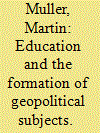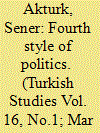|
|
|
Sort Order |
|
|
|
Items / Page
|
|
|
|
|
|
|
| Srl | Item |
| 1 |
ID:
102948


|
|
|
|
|
| Publication |
2011.
|
| Summary/Abstract |
Despite the crucial role of schools and universities in shaping the worldviews of their students, education has been a marginal topic in international relations. In a plea for more engagement with the power and effects of education, this paper analyzes the interplay of discipline and knowledge in the formation of geopolitical subjects. To this end, it employs material from ethnographic research at the Moscow State Institute of International Relations, the premier university for educating future Russian elites in the field of international relations. The paper draws on Foucault to chart the ensemble of disciplinary practices producing "docile bodies" and objective knowledge and traces how these practices are bound up with the geopolitical discourse of Russia as a great power: while they fashion the great power discourse with objectivity, disruptions in the discourse also disrupt disciplinary practices.
|
|
|
|
|
|
|
|
|
|
|
|
|
|
|
|
| 2 |
ID:
137426


|
|
|
|
|
| Summary/Abstract |
This article discusses the political origins, present-day significance, and implications of the intellectual movement known as “Eurasianism” in Turkey, a movement with Euroskeptic, anti-American, Russophile, neo-nationalist, secularist, and authoritarian tendencies, and including among its ranks socialists, nationalists, Kemalists, and Maoists. Since the turn of the twenty-first century, Eurasianism emerged as a major intellectual movement in Turkey, competing against Pan-Islamism, Pan-Turkism, and Westernism. Aspiration for a pro-Russian orientation in foreign policy, and a socialist–nationalist, Left-Kemalist government at home are the international and domestic faces of Turkish Eurasianism, which distinguish this movement from others. These orientations and their origins are situated within the history of intellectual movements in Turkey, going back to the Kadro and Yön movements in the 1930s and the 1960s, respectively. Similarities and actual links between Russian and Turkish Eurasianism are also discussed.
|
|
|
|
|
|
|
|
|
|
|
|
|
|
|
|
|
|
|
|
|